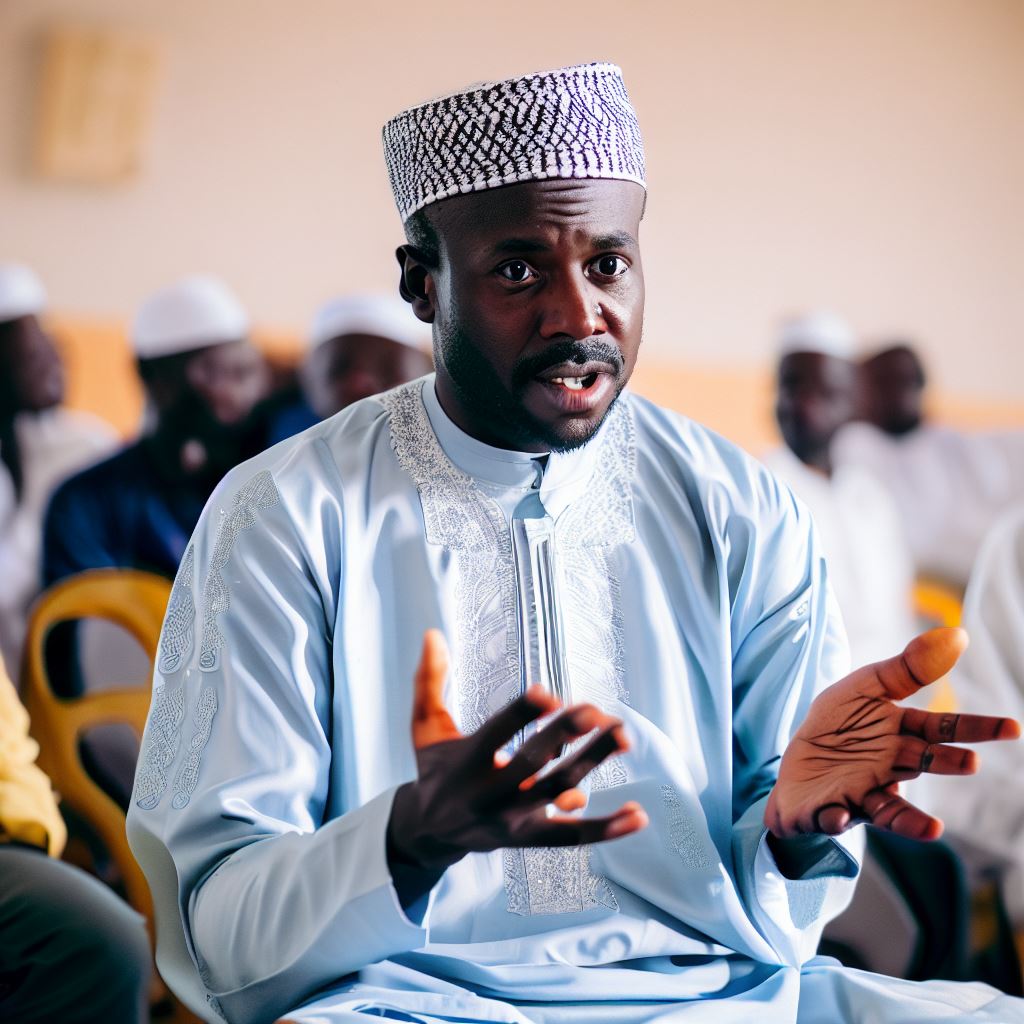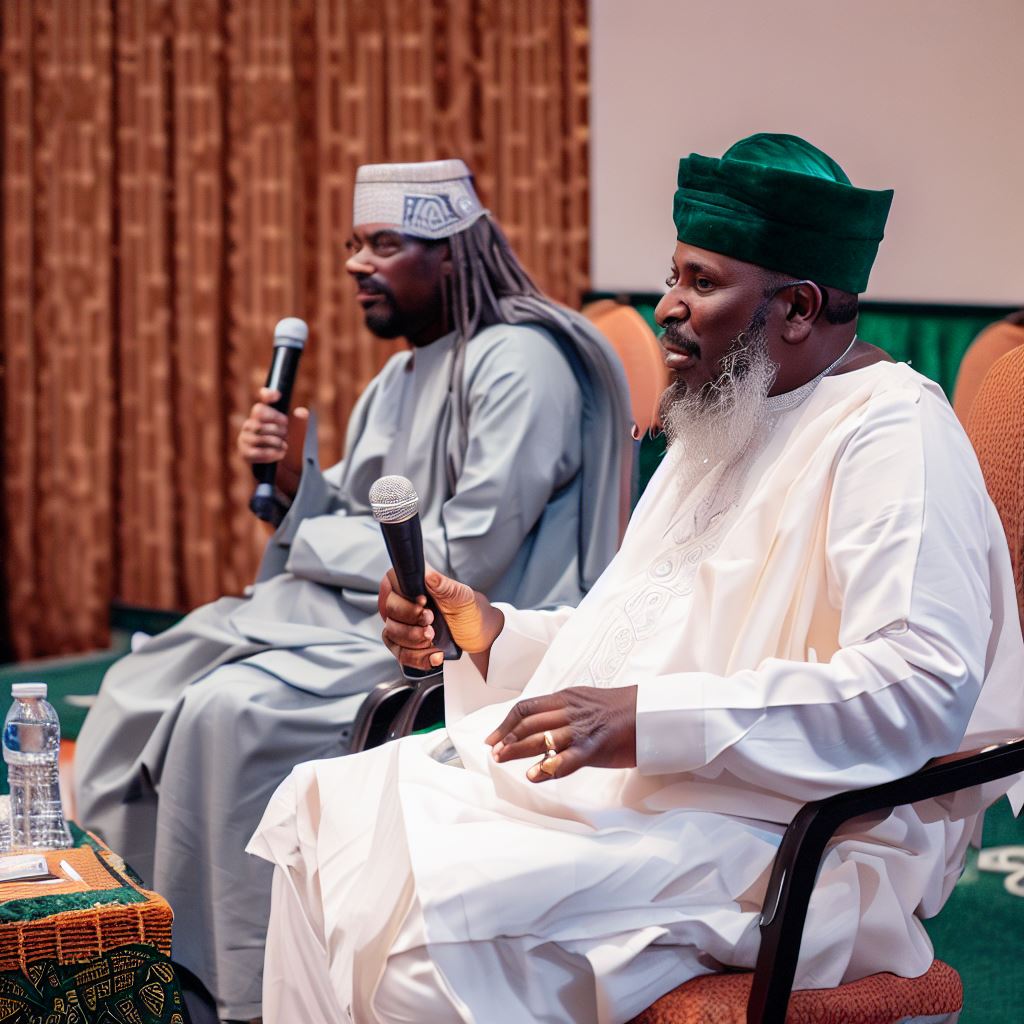Introduction
Nigerian Imams wield considerable influence in shaping global Islamic thought. Understanding their pivotal role necessitates a broader perspective on the significance of Islamic thought in the global arena.
Islamic thought transcends geographical boundaries, impacting millions of lives worldwide. It molds beliefs, practices, and societal norms, providing a moral compass for countless individuals.
Nigerian Imams occupy a unique position within this intricate web of Islamic discourse.
With their rich religious heritage, diverse interpretations, and commitment to spreading the message of Islam, they play a pivotal role in shaping the trajectory of global Islamic thought.
This post delves into the profound influence Nigerian Imams have on global Islamic discourse, exploring the factors that make their contributions invaluable.
It sets the stage for a comprehensive examination of their roles, perspectives, and impact on the global stage.
Historical Background of Nigerian Islamic Thought
In Nigeria, Islamic thought has a rich historical background that dates back to ancient times.
The development of Islamic ideas and practices in the region has been influenced by various factors, including the arrival of Islam through trade networks and the teachings of influential Muslim scholars.
Origins and Development of Islamic Thought in Nigeria
- Islam was first introduced to Nigeria in the 11th century through the trans-Saharan trade routes.
- Arab traders and scholars played a significant role in spreading the faith and establishing Islamic communities.
- The rise of powerful Islamic empires, such as the Kanem-Bornu and Sokoto Caliphate, further solidified the presence of Islam in Nigeria.
- The integration of Islamic practices and beliefs with local traditions gave rise to a unique Nigerian Islamic identity.
- The establishment of Quranic schools, known as madrasas, became central to the education and preservation of Islamic knowledge.
Contributions of Prominent Nigerian Imams throughout History
- Imam Uthman dan Fodio (1754-1817): As the founder of the Sokoto Caliphate, he played a pivotal role in the spread of Islam in northern Nigeria.
- Sheikh Abubakar Gumi (1922-1992): Known for his efforts in promoting Islamic education and fostering interfaith dialogue in Nigeria.
- Imam Muhammad Bello (1781-1837): A renowned poet and scholar, he played a significant role in consolidating the administrative structure of the Sokoto Caliphate.
- Sheikh Ja’afar Mahmud Adam (1963-2007): An influential preacher and scholar known for his teachings on social justice and women empowerment in Islam.
- Imam Abubakar Ahmad Gumi (born 1953): A contemporary Islamic scholar and peace advocate, known for his calls for peaceful coexistence and dialogue to address societal challenges.
The contributions of these prominent Nigerian Imams have shaped and influenced Islamic thought in Nigeria and beyond.
Their teachings and writings have provided guidance in matters of faith, social justice, education, and interfaith dialogue.
Throughout history, Nigerian Islamic thought has been characterized by a unique blend of Islamic teachings and indigenous traditions.
This fusion has given rise to a diverse and vibrant Islamic culture that continues to evolve and adapt to the needs of Nigerian Muslims.
Moreover, the Nigerian Imams’ endeavors in promoting Islamic education and advocating for peace and justice have gained recognition both nationally and globally.
Their efforts have contributed to the understanding of Islam as a religion of peace, tolerance, and social welfare.
In essence, the historical background of Nigerian Islamic thought reveals a fascinating journey of how Islam arrived and developed in Nigeria.
The contributions of influential Nigerian Imams throughout history have played a significant role in shaping and disseminating Islamic teachings to both local and global audiences.
Read: Cultural Influences on the Imam Profession in Nigeria
Influence of Nigerian Imams in Global Islamic Education
Nigerian Imams play a significant role in the dissemination of Islamic knowledge worldwide.
Their influence extends beyond their local communities and has a profound impact on Islamic education institutions and curriculum development worldwide.
Role of Nigerian Imams in the Dissemination of Islamic Knowledge Worldwide
Nigerian Imams serve as spiritual guides and scholars, responsible for teaching and interpreting the Quran and the teachings of Prophet Muhammad.
Through their sermons, lectures, and writings, they spread Islamic knowledge to a global audience.
Imams from Nigeria are known for their deep understanding of Islamic principles and their ability to communicate these teachings effectively.
Their knowledge and expertise attract students from around the world, who seek to learn from their wisdom and experience.
Nigeria’s geographical location and its large Muslim population also contribute to the influence of Nigerian Imams in global Islamic education.
With a population of over 200 million people, Nigeria is home to one of the largest Muslim communities in the world.
Many Nigerian Imams have established Islamic educational institutions and centers of learning, providing avenues for individuals from different countries to access Islamic education.
These institutions have become renowned for their comprehensive curriculum and the quality of education they offer.
Impact on Islamic Education Institutions and Curriculum Development
Nigerian Imams have made a significant impact on Islamic education institutions and curriculum development globally.
Their teachings and methodologies have influenced the structure and content of Islamic education in these institutions.
These Imams emphasize the importance of understanding the Quran in its original context and applying its principles to contemporary issues.
They encourage critical thinking and the study of various Islamic sciences, including theology, jurisprudence, and Arabic language.
Their emphasis on holistic education that combines religious studies with secular subjects has led to the development of integrated curriculum models.
This approach ensures that students receive a well-rounded education, preparing them to navigate the modern world while staying true to their Islamic values.
Nigerian Imams have also contributed to the development of educational resources and textbooks used globally in Islamic schools and institutions.
Their knowledge and expertise have been instrumental in shaping the content and methodology of these resources to ensure their accuracy and relevance.
Moreover, Nigerian Imams have played a crucial role in fostering interfaith dialogue and promoting tolerance and understanding among different religious communities.
Their teachings emphasize the importance of peaceful coexistence and mutual respect, contributing to a more harmonious global society.
In fact, Nigerian Imams have a significant influence on global Islamic education.
Their role in disseminating Islamic knowledge worldwide and their impact on curriculum development and educational institutions cannot be overstated.
Through their teachings, these Imams inspire and guide students from diverse backgrounds, contributing to the growth and development of Islamic education worldwide.
Read: How to Become an Imam in Nigeria: A Step Guide
Nigerian Imams’ Influence on Islamic Jurisprudence
Nigerian Imams have made significant contributions to Islamic jurisprudence and legal thought, both within Nigeria and on a global scale.
Their involvement in the interpretation and application of Sharia law has shaped the understanding of Islamic legal principles worldwide.
Academic Contributions
- Nigerian Imams have produced scholarly works on various areas of Islamic jurisprudence.
- Their writings encompass topics such as family law, criminal law, and commercial law.
- These academic contributions have been influential in shaping global Islamic legal discourse.
Expertise in Sharia Law
- Nigerian Imams are well-versed in the principles and methodologies of Sharia law.
- They possess in-depth knowledge of the Quran, Hadith, and other Islamic legal sources.
- This expertise has positioned them as authoritative figures in matters of Islamic jurisprudence.
Interpretation and Application of Sharia Law
- Nigerian Imams play a crucial role in interpreting and applying Sharia law within Nigeria.
- They ensure that the legal system adheres to Islamic principles while considering local customs.
- Their influence extends beyond Nigeria, as their interpretations are consulted in other Muslim-majority countries.
Adaptation to Local Contexts
- Nigerian Imams are adept at adapting Sharia law to the local cultural and socio-political context.
- They take into account the needs and aspirations of the Nigerian Muslim population.
- This approach has contributed to the relevancy and acceptance of Sharia law in Nigeria.
Global Impact
- Nigerian Imams have participated in international conferences and seminars on Islamic law.
- Their insights and experiences have enriched the global understanding of Islamic jurisprudence.
- They have also been actively involved in promoting dialogue and cooperation between Muslim scholars worldwide.
Influence on Legal Systems
- Nigerian Imams have influenced the development and implementation of Islamic legal systems in other countries.
- Their expertise and interpretations have guided the drafting of legislation in line with Sharia principles.
- This influence has been particularly evident in countries with a significant Muslim population.
Mediation and Conflict Resolution
- Nigerian Imams are often sought after as mediators in legal disputes and conflicts.
- Their knowledge of Islamic law and principles enables them to provide fair and just resolutions.
- Their involvement in dispute resolution has contributed to a peaceful coexistence within communities.
Strengthening the Rule of Law
- Nigerian Imams’ involvement in Islamic jurisprudence has played a vital role in strengthening the rule of law.
- Their advocacy for justice, accountability, and adherence to Sharia law has fostered respect for the legal system.
- This has ultimately contributed to the promotion of peace and stability within Nigerian society.
In general, Nigerian Imams have had a significant influence on Islamic jurisprudence and legal thought globally.
Their expertise, interpretations, and contributions have shaped the understanding and implementation of Sharia law, both within Nigeria and in other Muslim-majority countries.
Their involvement in academic research, dispute resolution, and the adaptation of Islamic law to local contexts has further enhanced their contributions to the field of Islamic jurisprudence.
Nigerian Imams continue to play a vital role in upholding the principles of justice, fairness, and the rule of law within the Islamic legal framework.
Read: Leading Mosques in Nigeria: Spotlight on Imams

Socio-Political Influence of Nigerian Imams
Role of Nigerian Imams in shaping socio-political discourse within the Islamic world
- Nigerian Imams play a crucial role in shaping socio-political discussions within the Islamic world.
- They influence public opinion by delivering powerful sermons on social issues during Friday prayers.
- Imams address topics such as poverty, corruption, education, and healthcare to promote social change.
- Their sermons often reflect the concerns and aspirations of the Muslim community in Nigeria.
- Nigerian Imams provide guidance on political matters while emphasizing the teachings of Islam.
Influence of Nigerian Imams on political movements
- Nigerian Imams have been instrumental in mobilizing the Muslim community for political purposes.
- They encourage Muslims to actively participate in political processes and exercise their voting rights.
- Imams use their platforms to endorse political candidates who align with Islamic values.
- They also urge Muslims to support candidates who prioritize issues affecting the Muslim community.
- Nigerian Imams contribute to political campaigns and extend their networks to political leaders.
Impact of Nigerian Imams on social activism
- Nigerian Imams are active participants in social activism, aiming for positive change.
- They advocate for human rights, gender equality, and peaceful coexistence among diverse communities.
- Imams promote dialogue and tolerance to address social issues and prevent conflicts.
- They organize charity events, establish educational institutions, and provide healthcare services.
- Nigerian Imams actively engage with NGOs and civil society organizations to improve social conditions.
Nigerian Imams as leaders and influencers
- Nigerian Imams possess strong leadership skills, commanding respect within their communities.
- They act as mediators during conflicts, fostering peace and reconciliation.
- Imams have the authority to provide legal and ethical guidance to their followers.
- They guide Muslims in upholding Islamic principles in their personal and public lives.
- Nigerian Imams are influential figures who shape public opinion and inspire social activism.
Challenges faced by Nigerian Imams in exerting socio-political influence
- Nigerian Imams encounter resistance from conservative elements who oppose social reform.
- Some political groups perceive Imams as a threat and attempt to undermine their influence.
- The government may impose restrictions on Imams to limit their involvement in politics.
- Imams often face criticism or backlash for expressing political opinions that challenge the status quo.
- Despite these challenges, Nigerian Imams persist in advocating for positive social change.
In review, Nigerian Imams play a significant role in shaping the socio-political discourse within the Islamic world.
Through their sermons and engagement in political activities, they influence public opinion, contribute to political movements, and promote social activism.
Despite the challenges they face, Nigerian Imams continue to act as leaders and influencers, striving for a better society based on Islamic principles.
Read: Salary and Benefits for Imams in Nigeria Explained
Nigerian Imams as Interfaith Ambassadors
Throughout the world, Nigerian Imams have played a crucial role in promoting interfaith dialogue and fostering harmony between different religious groups.
Their efforts in bridging religious divides and their involvement in advocating peaceful coexistence are commendable. Here are some key aspects regarding their significant contributions:
Interfaith Dialogue Initiatives
Nigerian Imams actively engage in interfaith dialogue initiatives, aiming to build understanding and respect between Muslims and individuals of other faiths.
They participate in seminars, conferences, and workshops that focus on improving religious understanding, discussing the commonalities, and transcending traditional misconceptions.
By facilitating open discussions, Nigerian Imams work towards dispelling stereotypes and promoting tolerance among diverse religious communities.
Promoting Religious Harmony
Nigerian Imams, as interfaith ambassadors, emphasize the importance of unity and cooperation among different religious groups.
They advocate for religious harmony and discourage hatred, discrimination, and violence, providing guidance based on Islamic teachings of peace and compassion.
By being visible figures within their communities, Nigerian Imams actively work towards breaking down barriers and building bridges between Muslims and non-Muslims alike.
Peaceful Coexistence
Nigerian Imams consistently emphasize the need for peaceful coexistence, encouraging their followers to engage in respectful interactions with people of all faiths.
They stress the importance of living in harmony with others, regardless of their religious beliefs, fostering an environment of mutual respect, understanding, and acceptance.
Through sermons, teachings, and community programs, Nigerian Imams promote social cohesion and help create a peaceful atmosphere that benefits the entire society.
Engaging in Interfaith Activities
Nigerian Imams actively engage in interfaith activities, collaborating with religious leaders from various backgrounds in joint initiatives for the betterment of their communities.
They participate in interfaith prayer gatherings, community service projects, and charity drives, showcasing the importance of unity and solidarity.
By working together with leaders of different faiths, Nigerian Imams set examples of cooperation, promoting the idea that religious diversity should be celebrated rather than seen as a source of conflict.
Combating Extremism and Radicalization
Nigerian Imams take a firm stance against extremism and radicalization, working diligently to prevent the spread of harmful ideologies.
They educate their congregations about the true teachings of Islam, emphasizing the rejection of violence and the promotion of peace.
Through their influential positions, Nigerian Imams challenge extremist narratives and discourage individuals from being swayed by extremist ideologies.
In a nutshell, Nigerian Imams have played a vital role in the global Islamic thought by serving as interfaith ambassadors.
Through their efforts in promoting interfaith dialogue, bridging religious divides, and fostering peaceful coexistence, they demonstrate the true essence of Islam – a religion of peace, tolerance, and respect for all.
Their work serves as an inspiration for individuals worldwide, reaffirming the belief in the power of unity and understanding among diverse religious communities.
Challenges Faced by Nigerian Imams in Global Islamic Thought
Identifying Obstacles and Criticisms
The pursuit of promoting global Islamic thought by Nigerian Imams is not without obstacles and criticisms.
These challenges can hinder their influence and reach. Some of the key challenges faced by Nigerian Imams include:
- Socio-political environment: Nigerian Imams often face obstacles due to the socio-political environment in which they operate.
This includes government regulations, religious tensions, and conflicts that can restrict their ability to freely promote global Islamic thought. - Misconceptions and stereotypes: Nigerian Imams encounter negative perceptions and stereotypes associated with their country.
These misconceptions can undermine their credibility and hinder the dissemination of their ideas. - Limited resources: Many Nigerian Imams face financial constraints and lack access to resources that could enhance their efforts in promoting global Islamic thought.
This includes funding for research, education, publications, and infrastructure. - Language barriers: The language barrier can be another challenge, as Nigerian Imams primarily communicate in local languages such as Hausa or Yoruba.
This limits their impact on the global Islamic discourse, which is predominantly conducted in English or Arabic. - Controversial interpretations: Nigerian Imams may encounter criticisms for their interpretations of Islamic teachings.
Differences in interpretation can lead to debates and disagreements, which can undermine their influence on a global scale.
Navigating Cultural, Ideological, and Theological Differences
In their pursuit of promoting global Islamic thought, Nigerian Imams also have to navigate various cultural, ideological, and theological differences.
This requires them to adopt strategies that bridge these gaps and foster understanding. Some approaches they employ include:
- Interfaith dialogue: Nigerian Imams engage in interfaith dialogues to build bridges with individuals from different religious backgrounds.
This helps to promote a more inclusive understanding of Islam and fosters mutual respect. - International collaborations: Nigerian Imams actively seek collaborations with global Islamic scholars and institutions.
Through these partnerships, they can gain exposure to diverse perspectives and contribute to the wider Islamic discourse. - Education and scholarship: Nigerian Imams emphasize the importance of education and scholarship to bridge the gap between different cultural, ideological, and theological backgrounds.
By encouraging continuous learning, they enrich their own knowledge and contribute to a more comprehensive understanding of Islam. - Adapting to the digital age: Nigerian Imams recognize the power of digital platforms to reach a global audience.
They utilize social media, online publications, and streaming platforms to disseminate their ideas and engage with individuals worldwide. - Empowering local communities: Nigerian Imams work towards empowering local communities, both within Nigeria and beyond.
By addressing socio-economic issues and providing educational opportunities, they contribute to the development of a more informed and engaged global Muslim community.
Despite the challenges faced, Nigerian Imams remain actively engaged in promoting global Islamic thought, striving to overcome obstacles and bridge differences.
Their dedication and efforts play a vital role in shaping the discourse surrounding Islam on a global scale.
Gain More Insights: Financial Aspects: Understanding a Pastor’s Salary in Nigeria
Conclusion
Nigerian Imams hold significant importance and wield considerable influence in shaping global Islamic thought. Their teachings and scholarship play a vital role in guiding Muslims worldwide.
Their interpretation of Islamic principles reflects the diversity and vibrancy of Nigeria’s Islamic community.
The contributions of Nigerian Imams go beyond their immediate community. Through their international engagements and interactions, they contribute to expanding the discourse on Islamic thought.
Their writings, speeches, and teachings disseminate their ideas and interpretations, enriching the collective understanding of Islam.
Nigerian Imams serve as catalysts for ongoing developments in global Islamic thought.
They bridge the gap between traditional scholarship and contemporary issues, synthesizing the timeless teachings of Islam with modern challenges.
Their ability to contextualize Islamic principles in a Nigerian and global context makes them uniquely valuable.
Furthermore, Nigerian Imams have the potential to make increasingly significant contributions in the future.
Publish Your Professional Profile, Business or Brand
Showcase your expertise, gain trust, and boost visibility instantly on Professions.ng.
Publish NowWith Nigeria being one of the largest Muslim populations globally, the influence of Nigerian Imams is likely to grow.
As they continue to engage in interfaith dialogue and international collaborations, their impact on Islamic thought will continue to expand.
Nigerian Imams have a profound importance and influence in global Islamic thought. Their teachings shape the understanding of Islam among Muslims worldwide.
Their ongoing contributions and potential for future developments ensure that their influence will continue to grow and shape the trajectory of Islamic thought on a global scale.




